 |
 |
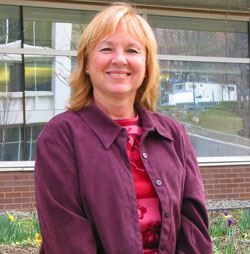
|
|
Jean Jenkins, Nurse, Senior Clinical Advisor, National Human Genome Research Institute (NHGRI), National Institutes of Health (NIH)
|
1. I chose this career because...
2. My transition from Bedside Nurse to Senior Clinical Advisor...
3. My typical workday involves...
4. What I like best/least about my work...
5. My career goals are...
6. When I'm not working, I like to...
|
|
1. I chose this career because...
|
Back to Top

|
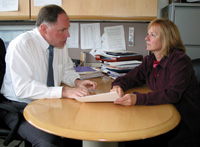
|
|
Jean Jenkins meets with a Genetic Counselor to work on a collaborative research project.
|
I chose to become a nurse, because of life circumstances that led me into the field. I grew up in a small rural town in Maryland. At that time and place, many young women considered nursing or teaching as the only career options available to them. I never really considered other possibilities. It wasn’t until many years later, that I realized I could have become a doctor. Still even in hindsight, I prefer being a nurse because I enjoy having time with patients and their families.
As a teenager, my boyfriend’s dad was in the hospital after being in a car accident. When I went to visit him, I was in awe of the way he received care. I liked the one-on-one patient care the nurses gave to him. Before this time, I had never been in a hospital. I believe that seeing the nurses on-the-job, made a lasting impression on me.
I always enjoyed science in school, especially chemistry. When considering my college education, I looked for medical and nursing programs in state because they were more financially feasible at the time. That’s when I first thought about becoming a medical doctor. Eventually, I decided to go into nursing at the University of Maryland.
College Education
- Doctor of Philosophy, Nursing, George Mason University (http://www.gmu.edu/), Fairfax, Virginia
- Master of Science, Nursing, Catholic University of America (http://www.cua.edu/), Washington, D.C.
- Bachelor of Science, Nursing, University of Maryland (http://www.umd.edu/), College Park & Baltimore, Maryland
|
|
2. My transition from Bedside Nurse to Senior Clinical Advisor...
|
Back to Top

|
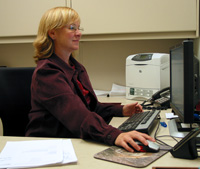
|
|
In her current role as a Senior Clinical Advisor, Jean Jenkin’s does a lot of research and writing at her desk.
|
For many years I worked at the NIH Clinical Center as an oncology (cancer specialty) nurse with the Public Health Service (PHS, http://www.usphs.gov/). With time, my career as a nurse began to change. I had varied opportunities as a nurse including roles in research implementation and education. I began working in more of an administrative role as the Chief of Cancer Nursing Services, Clinical Center (CC) Nursing Department and the National Cancer Institute (NCI). I supervised other nurses who were providing care for patients receiving gene therapy. Gene therapy was then a revolutionary technique that emerged about the same time that the Human Genome Project (http://www.ornl.gov/sci/techresources/Human_Genome/home.shtml) was underway. I saw how this new technology made a great impact on modern medicine and changed the way nurses delivered bedside care.
While working at the CC, I was also going to school part-time to get my PhD. Because of my interests, I approached the director of the National Human Genome Research Institute (NHGRI) about doing an internship (a requirement for my PhD program). During my internship, I was part of a working group, the National Coalition of Health Professional Education in Genetics (NHCPEG, http://www.nchpeg.org/). The group’s mission is to “promote health professional education and access to information about advances in human genetics to improve the health care of the nation.” My work with the group focused on summarizing the core competencies that all health care providers, including nurses, need for integration of genetics and genomics in patient care and the nursing practice. Building on the NCHPEG efforts, we eventually developed nursing specific competencies and outcome learning indicators (http://www.genome.gov/27527634).
I also collaborated with one of NHGRI’s genetic counselors on another project. We were trying to understand the impact of the genetics and genomics revolution on the patients and their families. We were asking questions that had many ethical and social implications. For example, if you had a family history of a certain type of cancer, and a genetic test was readily available through your local doctor’s office, would you get tested? We wanted to know if people were interested in or feared this kind of testing. Were they concerned about insurance coverage if the genetic test revealed a predisposition for developing a certain disease? What changes in health behaviors and screening occurred if testing was done?
In time, I completed my doctoral dissertation entitled The Innovation of Diffusion Research on Genetics Education for Nurses.
From Cancer Nurse to Cancer Patient
About a year after completing my PhD program, I began experiencing fatigue. A routine mammogram indicated that my lymph nodes were enlarged. A computed tomography (CT) scan (http://www.nlm.nih.gov/medlineplus/tutorials/ctscan/htm/index.htm) revealed a large abdominal mass. After additional tests, I was diagnosed with non-Hodgkin lymphoma (http://www.cancer.gov/cancertopics/types/non-hodgkin). This was an ironic moment for me, as I had worked as an oncology nurse for more than 20 years. Now I was the cancer patient. From a clinical perspective, I understood some of the challenges that lay ahead.
In the months to follow, I learned even more about the genetic changes that occur in normal cells that eventually become cancerous. I understood further how those genetic changes could help guide the decisions about my healthcare options. What I learned helped me decide to become part of a clinical trial (http://www.cancer.gov/clinicaltrials). It included standard chemotherapy followed by a genetically engineered vaccine. The vaccine was designed to work specifically against my cancer cells. Being involved and making decisions was one way that I could gain some control of my life.
Over the course of my treatment, I continued to work full time. It was convenient to work, and get treatments and follow-up care in the same hospital. During that time, my colleagues helped me retain some privacy, make decisions, and just offered me their support. My family’s love and support also helped me cope with the demands of balancing my work and the cancer treatments, which often left me exhausted and nauseated.
Since finishing the course of treatments, I continue to get periodic check-ups in the clinic. My doctor told me that there was no cure for my cancer and that it often recurred in three to five years. Each time I go in for blood work, there is still a fear that some test may signal the cancer’s return. My cancer has been in remission now for seven years.
Eventually, I retired from the PHS after my cancer diagnosis. In an effort to have a more balanced life, I came back to work at NHGRI as a contractor (http://www.genome.gov/26524449), but only on a part time basis. Having cancer is a major event, and a time for learning more about yourself. The doctors and nurses I met along the way were essential to my coping, understanding, and survival. That’s why it is even more important in my current work to help nurses and other health professionals understand the clinical implications of genetic and genomic discoveries. I have personally benefited because of the progress in this research, and I want to ensure that others have access to information about their options.
Mostly, cancer has taught me a whole new way of viewing myself, and helped me redefine what is truly important in life. I was asked to contribute an article about survivorship to the Seminars in Oncology Nursing periodical. In doing so, I wrote about my experiences from both a professional and personal perspective (http://www.seminarsoncologynursing.com/article/S0749-2081(06)00016-7/abstract).
|
|
3. My typical workday involves...
|
Back to Top

|
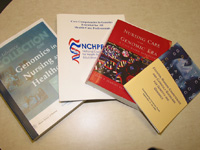
|
|
A small sampling of Jean Jenkin’s publications are displayed, each representing some of her significant contributions to genomics and genetics education for healthcare professionals.
|
My typical workday involves a variety of activities with a major focus on “bench to bedside medicine.” That is, taking the innovations in genomics and genetics, and integrating them into education programs, resources and curricula for nurses and other health care professionals nationwide. Currently, I work part time, three days a week, as a Senior Clinical Advisor.
My Major Tasks
Promoting Awareness and Understanding to Health Professionals - I work to develop national education initiatives for health professionals that promote the awareness and understanding of clinical applications based on genetic and genomic discoveries. These efforts include developing curricula and nursing competencies (professional standards) in genetics and genomics, coordinating development of publications in peer-reviewed nursing journals, and developing a newsletter to inform healthcare providers nationwide.
Collaborating with others to Develop and Implement Educational Resources and Policies - I work with professional organizations, such as The National Coalition for Health Professional Education in Genetics, the Health Resources and Services Administration, and other groups to enhance the perspective, progress, and visibility of NHGRI goals. I collaborate with NHGRI’s Education and Community Involvement Branch to develop outreach materials for students and the general public. The goal is to help everyone understand how the ever-growing discoveries in genetics and genomics impacts our lives.
Research and Writing – I work with other professionals at the NHGRI in collaborative research projects. In a project with the Intramural Social and Behavioral Research Branch, we are assessing the attitudes, values and knowledge of nurses about genetics and genomics to serve as the basis to measure effectiveness of planned education activities. Once the analysis is complete, we plan to publish the study results in a peer-reviewed professional journal. I have also authored numerous articles for professional nursing journals and co-authored three nursing textbooks including Nursing Care in the Genomic Era: A Case Based Approach.
|
|
4. What I like best/least about my work...
|
Back to Top

|
What I like best about my work is the opportunity to learn new things. In genetics, there is always a new discovery and its potential application to improve our lives. I also enjoy working with my colleagues. They are innovative and focused on making a difference.
What I like least about my work is when funds are insufficient to pursue all the things I’d like to accomplish.
|
|
5. My career goals are...
|
Back to Top

|
My career goals are to make sure that nurses recognize the value of the research discoveries in genetics and genomics for patient care. There are significant ethical and social implications to consider as we work to improve patient care and healthy outcomes.
|
|
6. When I'm not working, I like to...
|
Back to Top

|
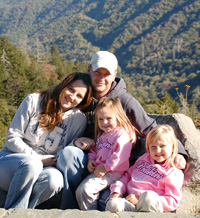
|
|
A family photo of Jean Jenkins' son and his family on a recent fall hiking trip.
|
When I’m not working, I like to spend time with my granddaughters, who live nearby. In my free time, I work with their mother to run a dog grooming and boarding business. I also enjoy canoeing on the Potomac River.
|
|
|
|
 |